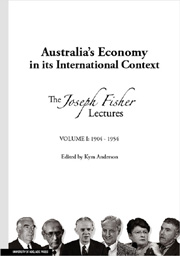Book contents
- Frontmatter
- Contents
- Preface
- List of lectures in volume 2 (1956-2009)
- Contributors to opening chapters
- The benefactor Joseph Fisher
- The lectures
- The lecturers
- 1 1904 – Commercial education
- 2 1906 – Commercial character
- 3 1908 – The influence of commerce on civilization
- 4 1910 – Banking as a factor in the development of trade and commerce
- 5 1912 – Australian company law, and some sidelights on modern commerce
- 6 1914 – Problems of transportation, and their relation to Australian trade and commerce
- 7 1917 – War finance: Loans, paper money and taxation
- 8 1919 – The humanizing of commerce and industry
- 9 1921 – Currency and prices in Australia
- 10 1923 – Money, credit and exchange
- 11 1925 – The Guilds
- 12 1927 – The financial and economic position of Australia
- 13 1929 – Public finance in relation to commerce
- 14 1930 – Current problems in international finance
- 15 1932 – Australia's share in international recovery
- 16 1934 – Gold standard or goods standard
- 17 1936 – Some economic effects of the Australian tariff
- 18 1938 – Australian economic progress against a world background
- 19 1940 – Economic coordination
- 20 1942 – The Australian economy during War
- 21 1942 – Problems of a high employment economy
- 22 1946 – Necessary principles for satisfactory agricultural development in Australia
- 23 1948 – The importance of the iron and steel industry
- 24 1950 – The economic consequences of scientific research
- 25 1952 – Australian agricultural policy
- 26 1954 – The economics of Federal-State finance
5 - 1912 – Australian company law, and some sidelights on modern commerce
Published online by Cambridge University Press: 05 June 2012
- Frontmatter
- Contents
- Preface
- List of lectures in volume 2 (1956-2009)
- Contributors to opening chapters
- The benefactor Joseph Fisher
- The lectures
- The lecturers
- 1 1904 – Commercial education
- 2 1906 – Commercial character
- 3 1908 – The influence of commerce on civilization
- 4 1910 – Banking as a factor in the development of trade and commerce
- 5 1912 – Australian company law, and some sidelights on modern commerce
- 6 1914 – Problems of transportation, and their relation to Australian trade and commerce
- 7 1917 – War finance: Loans, paper money and taxation
- 8 1919 – The humanizing of commerce and industry
- 9 1921 – Currency and prices in Australia
- 10 1923 – Money, credit and exchange
- 11 1925 – The Guilds
- 12 1927 – The financial and economic position of Australia
- 13 1929 – Public finance in relation to commerce
- 14 1930 – Current problems in international finance
- 15 1932 – Australia's share in international recovery
- 16 1934 – Gold standard or goods standard
- 17 1936 – Some economic effects of the Australian tariff
- 18 1938 – Australian economic progress against a world background
- 19 1940 – Economic coordination
- 20 1942 – The Australian economy during War
- 21 1942 – Problems of a high employment economy
- 22 1946 – Necessary principles for satisfactory agricultural development in Australia
- 23 1948 – The importance of the iron and steel industry
- 24 1950 – The economic consequences of scientific research
- 25 1952 – Australian agricultural policy
- 26 1954 – The economics of Federal-State finance
Summary
The first time two or more people clubbed their capital in order to start some common venture with a view to profit, they began a movement which culminated in the modern “Limited Liability Company.” Their venture took the form of a partnership, and partnership has ever since played a conspicuous part in the industrial and commercial development of the world. It has enabled thousands of successful ventures to be initiated, upon which no one of the contributing parties would have cared to embark alone. It has, of course, yielded its quota of failures, but that applies to any form of commercial enterprise – since it is impracticable to eliminate the gambler, the fool, and the inexperienced operator.
But the real canker at the heart of partnership, as a method of co-operative enterprise, was the unlimited liability of the partners for the firm debts. Within the ambit of the recognised partnership business each partner could pledge the credit of the firm to any extent, and each partner became liable for the common debts to the last pound of his private assets. This pre-supposed the greatest confidence between partners at the outset of their mutual career, yet almost necessarily planted in the minds of each an uneasy feeling about the possible actions of his co-partners. Furthermore, private partnership became a clumsy affair with several partners, and impossible with many. The system excluded the practicability of a great number of people, with little capital each, contributing towards a common enterprise with individual safety as regarded liability for the joint debts.
- Type
- Chapter
- Information
- Australia's Economy in its International ContextThe Joseph Fisher Lectures, pp. 99 - 122Publisher: The University of Adelaide PressPrint publication year: 2009



